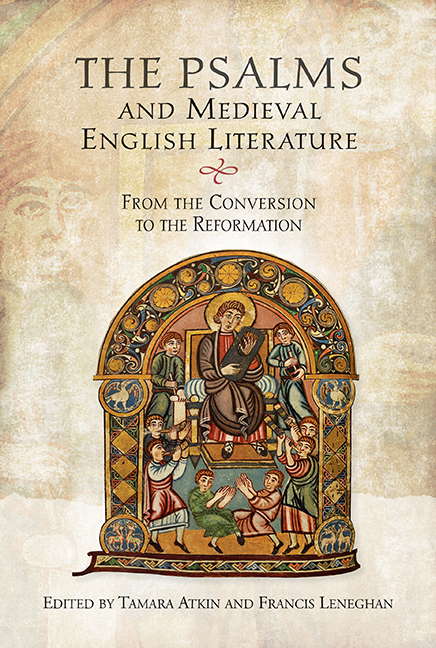Book contents
- Frontmatter
- Contents
- Figures
- Contributors
- Preface
- Acknowledgements
- Abbreviations
- Miscellaneous Frontmatter
- Introduction A Case Study of Psalm 50.13 in Old and Middle English
- I Translation
- II Adaptation
- III Voice
- 10 Maidstone's Psalms and the King's Speech
- 11 The Songs of the Threshold: Enargeia and the Psalter
- 12 Psalms as Public Interiorities: Eleanor Hull's Voices
- 13 Vox ecclesiae, vox Christi: the Psalms and Medieval English Ecclesiology
- Index
12 - Psalms as Public Interiorities: Eleanor Hull's Voices
from III - Voice
Published online by Cambridge University Press: 09 May 2017
- Frontmatter
- Contents
- Figures
- Contributors
- Preface
- Acknowledgements
- Abbreviations
- Miscellaneous Frontmatter
- Introduction A Case Study of Psalm 50.13 in Old and Middle English
- I Translation
- II Adaptation
- III Voice
- 10 Maidstone's Psalms and the King's Speech
- 11 The Songs of the Threshold: Enargeia and the Psalter
- 12 Psalms as Public Interiorities: Eleanor Hull's Voices
- 13 Vox ecclesiae, vox Christi: the Psalms and Medieval English Ecclesiology
- Index
Summary
An air of anomaly lingers about Eleanor Hull. There is one manuscript only, Cambridge, University Library, MS Kk. I. 6, containing her commentary on the Penitential Psalms and the meditations on the days of the week, together with other devotional texts and religious poems by Lydgate. We would have been slow to attribute the psalm commentary to a woman author were it not for the explicit in the manuscript by Richard Fox, Steward of St Alban': ‘Here endeth the vij Psalmus the wheche Dame Alyanore Hulle transelated out of Frensche into Englesche’. Thanks to Alexandra Barratt, we have not only an excellent edition of the psalms commentary but also a good deal of information about Hull's life: daughter of one retainer of John of Gaunt, she married another, served Queen Joan of Navarre, widow of Henry IV, and was admitted to the confraternity of St Albans in 1417. She probably retired after her husband' death in 1421 to the priory of the Benedictine nuns at Sopwell, where she knew the learned priest and lawyer Roger Huswyf, who was to serve as her executor. Born in the 1390s, she died in 1460. She thus had impeccably Lancastrian credentials and has been read as a poster child for post-Arundel orthodoxy. Although Barratt rightly promoted Hull's work in the context of ‘medieval women writers’, it was for a while as if Hull was the wrong type of woman: neither a visionary nor a Lollard. There is also a problem of sources. While one has been found for the meditations on the days of the week, no French or Anglo-Norman original has yet been identified for her psalm commentary — which, in any case, is full of identifiable citation and reference to other commentaries, especially Augustine and Peter Lombard. In Psalm 6, for example, she combines Lombard's interest in title and genre with Augustine' emphasis on the eighth day of Judgement. This is a challenge to our reading skills. At what points do we think we hear Hull's voice? Once we think we have, how do we value her part? Barratt makes both a minor case — for Hull as a ‘competent’ translator — and a major one for her psalm commentary as ‘one of the most sustained examples of scriptural exegesis in English’.
- Type
- Chapter
- Information
- The Psalms and Medieval English LiteratureFrom the Conversion to the Reformation, pp. 298 - 317Publisher: Boydell & BrewerPrint publication year: 2017

